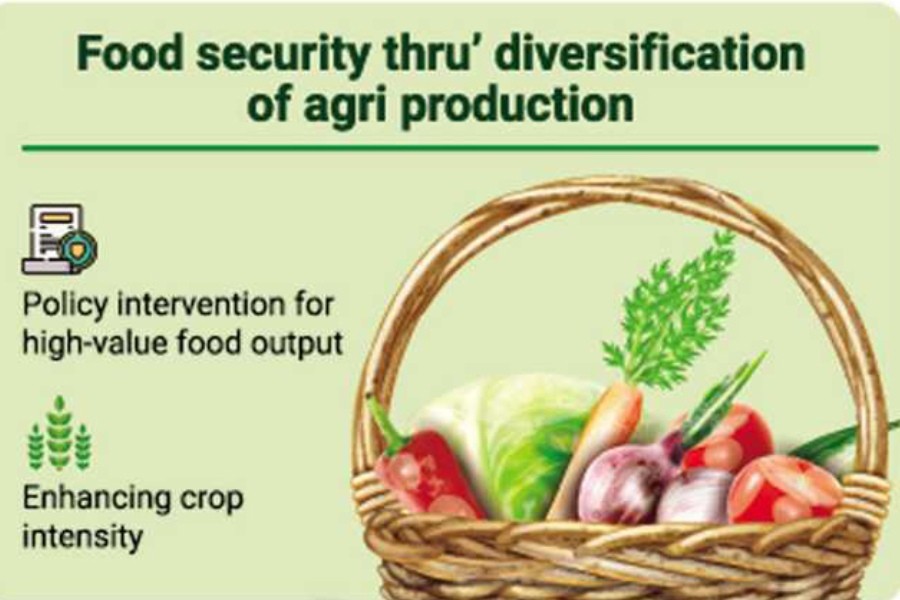In terms of fortifying food and nutrition security in the country, speakers at a programme on Saturday emphasised diversification of agricultural production through disbursing more farm credit, promoting contract farming, and investing in research to increase the productivity of rice, non-rice crops, livestock, and fisheries.
They also suggested engaging the private sector for developing agricultural value chains, policy intervention for producing high-value and high-nutritive food production, and enhancing crop intensity against the backdrop of decreasing arable lands.
The suggestions came at a webinar - "Mobilising Action for Food System Transformation in Bangladesh" - jointly organised by the Economic Development Research Organisation (EDRO), the Financial Express, and the Daily Banik Barta.
State Minister for Planning Professor Dr Samsul Alam addressed the programme as the chief guest.
Senior Research Fellow of International Food Policy Research Institute (IFPRI) Dr Suresh Chandra Babu presented the keynote paper titled "Overview of Outcomes of United Nations Food System Summit, 2021".
Associate Professor of Economics at Jatiya Kabi Kazi Nazrul Islam University and Executive Director of EDRO Md Tanjil Hossain chaired the programme, moderated by EDRO Associate Researcher Helal Ahmmad Jony.
IFPRI Country Programme Director in Bangladesh Dr Akhter Ahmed, Professor of Department of Agribusiness and Marketing at Bangladesh Agricultural University (BAU) Dr Mohammad Jahangir Alam, Bangladesh Agricultural Research Council (BARC) Member Director Dr Md Abdus Salam, and Professor of Department of Economics at University of Dhaka Dr Mohammad Sahadat Hossain Siddique spoke as panellists.
Besides, Development Journalist and Special Correspondent of the Financial Express FHM Humayun Kabir and former Director General of Ministry of Food Naser Farid spoke as discussants.
The state minister in his speech said intensive research is required to formulate evidence-based policies for further development of the country's agriculture.
Terming allocation of 0.6 per cent of the GDP for research and innovation very low, he said the allocation for research in the country should be at least 1.0 per cent of the GDP, and the government is quite aware of the issue.
Referring to decreasing trend in food insecurity in the country, Dr Alam opined that Bangladesh has rebounded from the temporary food insecurity - induced by the pandemic. Its economy has been on track with positive growth, while most of the countries in the world - including the neighbouring ones - posted negative growth.
However, in terms of production diversity, Dr Alam was in favour of allowing the market to work with less interference from the government as much as possible.
Rather, the government will only oversee and take actions, if the competition is unfair and hindered by the market actors and other factors, he added.
In the meantime, the state minister said, "It is true that rice is the major source of calorie in the country. But the trend is getting changed, as calorie intake from rice decreased to 64 per cent in 2020 from 70 per cent in 2015, which may further decrease due to diversified agricultural production."
He also focused on nutrition intervention through behaviour change communication to increase food and nutrition security in the country.
In the presentation, Dr Babu said sustainable food systems are directly linked to 1, 2, 3, 6, 7, 12, 13, 14 and 15 of the Sustainable Development Goals (SDGs) - including poverty alleviation, zero hunger, health and climate action.
So, inclusive approach to improve the food systems can also help achieving other targets of the SDGs in a comprehensive manner.
In policy recommendations, he emphasised rebuilding food systems to solve the long-term hunger challenges and manage acute shocks like disease outbreaks and climate change issues.
Reducing adverse impacts of climate change on agricultural production by lowering emissions of critical climate-warming gases can also help improve the transformation of the food systems.
Besides, Dr Babu suggested reducing deforestation and supporting healthy terrestrial ecosystems as well as using clean and renewable sources of energy can also give impetus to ensuring food security.
In another presentation, Dr Ahmed said about 64 per cent of the calorie intake in Bangladesh comes from rice, while the staple is also the source of 50.9 per cent of protein, 32.1 per cent iron, and 56 per cent zinc.
As rice is not a good source of protein and other minerals, it is required to diversify the dietary practice of the country's people, he opined.
Of the total farmers in the country, over 54.5 per cent grow only rice, which shows that the country's agricultural production diversification needs to go a long way.
Meanwhile, severe or moderate food insecurity in Bangladesh gradually reduced 14.5 per cent during September-October of 2021 from 45.6 per cent of June 2020.
"The development is quite impressive due to people's resilience against the pandemic, while food insecurity reduced even from the pre-pandemic level of 15.1 per cent (in 2019)," he added.
Referring to increasing agricultural output, Dr Siddique said despite a huge reduction of arable lands due to rapid urbanisation and industrialisation, agricultural output has increased over the years following different policy interventions and the resilience of farmers.


